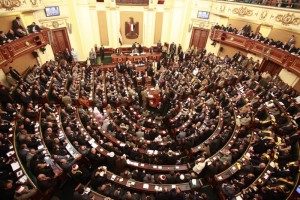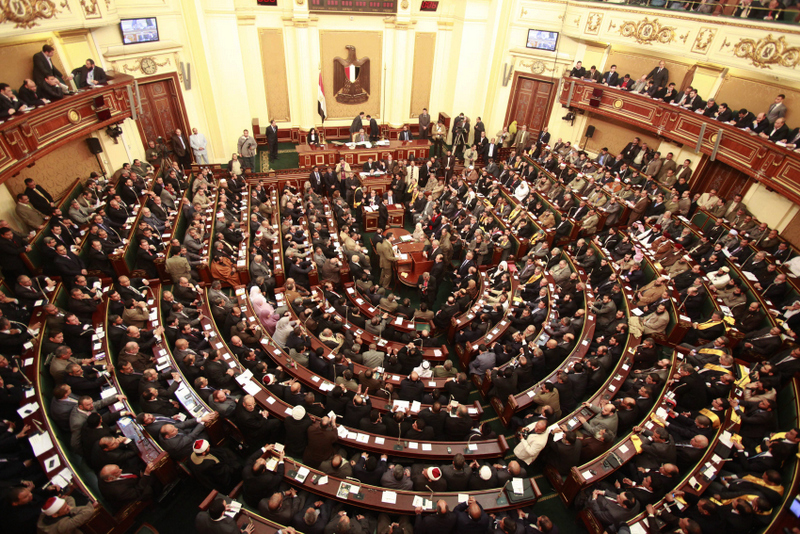
(AFP File Photo)
Nineteen political parties met at the headquarters of Al-Wafd Party Saturday to prepare a joint list of candidates who will run for the parliamentary elections, scheduled to start in March.
“We invited 24 political parties, of which 19 responded,” said Al-Wafd Party’s chairman El-Sayed El-Badawi in a video-statement available on Al-Wafd newspaper’s website. According to El-Badawi, the coalition should represent a “political harmony”.
The meeting comes after President Abdel Fattah Al-Sisi demanded to meet with party leaders ahead of the elections last week, during which he reportedly encouraged parties to form a united coalition, which he would support.
Al-Wafd Party took the lead in calling for an electoral union described by the party’s press statements on their official Facebook page as “a response to Al-Sisi’s suggestion”.
“Let’s clarify the president’s talk about the one-list coalition, as those statements came within a particular context where politicians asked Al-Sisi if he was to support the list of former prime minister Kamal El-Ganzoury, which he denied and said instead he was willing to support a list where all political forces are grouped,” Mohamed Abul-Ghar, chairman of the Egyptian Social Democratic Party (ESDP), said in a televised interview last Wednesday.
However, Abul-Ghar did not attend the meeting. “We believe the list is going to be weak in the face of El-Ganzoury’s; on the other hand we are thinking of collaborating with his rival politician and member of the committee that wrote the constitution passed in 2014, Abdul Gelil Mostafa,” he said.
On the other hand, Shady El-Ghazaly Harb, a member of the Coalition for the Revolutionary Youth, stated during the meeting that Al-Wafd, as a well established party, will be able to group the most renowned politicians, adding that the Al-Wafd alliance could actually be stronger than El-Ganzoury’s list.
Al-Wafd gathered some party leaders, politicians and public figures to form several committees to propose and select candidates that will make the common list. On one hand, there will be a committee in charge establishing a joint memorandum of understanding.
El-Badawi announced that the committee is composed of Samir Ghattas, vice-president of Homat Al-Watan Party (Guards of the Homeland); Ahmed El-Borei, former minister of solidarity and member of Al-Dostour Party, Amr El-Shobaky, Secretary-General of Al-Wafd Coalition and Nabil Zaki, member of Al-Tagammu Party.
Al-Wafd then chose Sameh Ashour, the head of the Lawyers’ Syndicate and chairman of the Nasserist Party, to be responsible for setting the standards of candidates’ selection.
A second committee should decide on the standards to abide by in choosing representative candidates of the coalition, and includes Hossam El-Khouly, Al-Wafd’s Deputy Secretary-General; Amin Rady, Secretary-General of the Conference Party; Mohamed Sami, chairman of Al-Karamah Party; Mohamed Badran, president of Mostakbal Watan Party and Tamer Waguih, president of Al-Reyada Party under foundation.
The electoral list is composed of 120 candidates, on which people vote as a whole, meaning that voting for a list is equal to choosing the 120 members on it. The elected members are to be distributed according to the geographical division of constituencies.
The distribution according to the law divides the list into two 45-name lists and two 15-name lists covering the entire country. Besides those 120 elected candidates, 420 others run as individual candidates, either as part of a political party or independently.
As negotiations continue between various political forces to join efforts and candidates in order to ensure their best representation in a number of parliamentary seats, the Free Egyptians Party headed by Naguib Sawiris remains the only political party determined to stay out of the coalitions.
Furthermore, most electoral coalitions rejected Al-Nour Party, representing the major Islamist force in the upcoming elections, despite the invitation of its chairman Younis Makhioun to Al-Sisi’s meeting.




